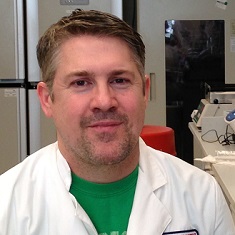
James P. Madigan, Ph.D.
- Center for Cancer Research
- National Cancer Institute
- Building 10, Room 8D18
- Bethesda, MD 20892
- 240-760-7216
- james.madigan@nih.gov
RESEARCH SUMMARY
Dr. Madigan is a staff scientist in the laboratory of Samira Sadowski, within the Surgical Oncology Program. He is currently working on uncovering novel driver events and signaling pathways of neuroendocrine tumors (NETs). His research is focussed on expanding our knowledge base regarding the role of abberent epigenetic changes in NETs, which appear to be particularly important for their pathogenesis and progression. Dr. Madigan is also using gene loss-of-function and small molecule inhibitory screens to better inform on focused targeted therapy for NET patients.
Areas of Expertise

James P. Madigan, Ph.D.
Research
Dr. Madigan is an expert in signal transduction pathway analysis, with a focus on post-translational modifications such as phosphorylation, ubiquitination and acetylation, and how derangement of the pathways controlling these post-translational modifications play a prominent role in cancer progression and resistance to therapies. He is currently working on uncovering novel driver mutations and signaling pathways of neuroendocrine tumors (NETs), both pancreatic and gastrointestinal. In particular, his research is focussed on expanding our knowledge regarding the role of aberrant epigenetic changes which appear to be particularly important for the pathogenesis and progression of NETs. Dr. Madigan is also formulating novel models of NET growth for use in gene loss-of-function or small molecule inhibitory screens to better inform on focused targeted therapy for NET patients.
Publications
A role for ceramide glycosylation in resistance to oxaliplatin in colorectal cancer.
The tuberous sclerosis complex subunit TBC1D7 is stabilized by Akt phosphorylation-mediated 14-3-3 binding
Regulation of Rnd3 localization and function by protein kinase C alpha-mediated phosphorylation
Inhibiting farnesylation of progerin prevents the characteristic nuclear blebbing of Hutchinson-Gilford progeria syndrome
DNA double-strand break-induced phosphorylation of Drosophila histone variant H2Av helps prevent radiation-induced apoptosis
Biography

James P. Madigan, Ph.D.
Dr. Madigan received his undergraduate degree in Biological Sciences from the University at Buffalo (SUNY) in 1999. After graduation, he worked for several years at a small biotech company focussed on vaccine development against both melanoma and HIV. He then transferred to the New York State Department of Health, in Albany, NY, studying histone post-translational modifications and chromatin remodeling. Dr. Madigan received his Ph.D. in Molecular Biology from the University of North Carolina at Chapel Hill in 2008, performing his dissertation work in the laboratory of Adrienne Cox. While at UNC-Chapel Hill, his research work centered around signaling mechanisms regulating the cellular localization and function of the Ras and Rho families of small GTPases. Dr. Madigan did postdoctoral work in the lab of Daniel Rosenberg, at the UCONN Health Center, dissecting the role of ceramide metabolism in resistance to oxaliplatin in colorectal cancer. Dr. Madigan spent 6 years in the laboratory of Michael Gottesman, within the Laboratory of Cell Biology at the NCI, identifying novel post-translational mechanisms regulating signaling pathways important for resistance to cancer chemotherapeutics.
